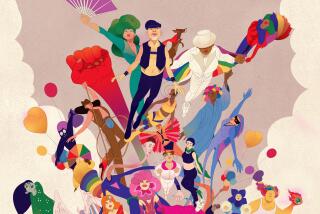‘Hidden Legacies’: Birth of a Healing Melody
- Share via
Back when Jon Bailey headed the Institute of Sacred Music at Yale University, few students or colleagues would have figured him to later direct a gay men’s chorus.
Then again, a few years earlier, no one would have expected this son of a Methodist minister to be involved with music at all.
For the record:
12:00 a.m. Aug. 19, 1992 For the Record
Los Angeles Times Wednesday August 19, 1992 Home Edition View Part E Page 3 Column 3 View Desk 1 inches; 21 words Type of Material: Correction
Cantata Composer--Roger Bourland is the composer of the cantata “Hidden Legacies,” mentioned in the Aug. 2 story on the Gay Men’s Chorus of Los Angeles.
As a boy in Indiana, Bailey loved music. He was good at it. But somehow he got it in his head that music was unsavory. At Northwestern University, he avoided the music department entirely, he says, because “that’s where all the queers were.”
Bailey graduated with a degree in philosophy, then took off on a two-year hitchhiking tour around the world before returning to attend seminary at Drew University. By then, he had confronted his musicality.
But not his sexuality.
After a Fulbright scholarship to Germany, he married, figuring that would “fix” his wobbling sexual orientation. It didn’t, nor did the two children he fathered and reared. Finally, at age 42, while heading the music department at Pomona College at Claremont, he faced facts.
As he grappled with his sexual identity, he realized he was confronting a universal human dilemma: the struggle to be oneself.
“Being gay brings clarity to the process of coming out,” he says. “But, ultimately, everyone must be who they are.”
Bailey’s ex-wife has since remarried. Bailey and her new husband are friends, and his children spend each summer with their father.
That’s not as unusual as people might think, Bailey says. “On Father’s Day, we asked for all the dads in the chorus to stand up. About 20 members stood.”
Bailey still teaches at Pomona, where he also directs the choir and glee club.
But it’s when he’s conducting the Gay Mens Chorus of Los Angeles, or clowning at rehearsal, or giving the group one of his serious pep talks, that he is most truly himself.
When he first became director, Bailey went on the group’s annual Christmas tour of hospices and AIDS clinics. Each time they sang to a dying patient, Bailey would step out of the room and weep.
But the pain was instructive.
“I’ve seen so many men die, that sad as it is, it’s a reality that you slowly let into your own consciousness, and the fear goes away,” he says. “I became more open to death as a part of life.”
Last year, Bailey decided it was time to confront AIDS head-on--with music.
He asked composer John Bourland, a UCLA music professor, to write a choral cantata that tracked the epidemic and the gay community’s response. Bourland turned to UCLA professor and lyricist John Hall, and the two went to work.
A year later, they finished “Hidden Legacies.”
Not everyone in the chorus liked it at first.
“I thought the lyrics were kind of trite,” said one member.
But when the chorus began singing the work, many couldn’t make it through a song without their emotions pouring out. Most felt a transcendent connection to the songs.
When the group performed “Hidden Legacies” earlier this year in Los Angeles, some critics weren’t impressed.
For once, though, chorus members didn’t care. Sure of their own emotional response, they grew intent on sharing it with others who had been devastated by AIDS.
Karl Menninger, founder of the the famous medical clinic, had a universal prescription for any serious ailment, Bailey says: “Join a chorus.” And Bailey believes that the songs, and the singing, can help heal the gay community.
He knows it has helped heal the chorus.
“In a chorus, you have to meet your brother. You have to listen to each other. Only if you listen to each other are you able to sing with each other,” he says.
“Since the Middle Ages, there’s been an interesting connection between music and the religious world.” Religion, he explains, derives from the word ligament, or ligare --a binding together.
“Over time, it became about all this stuff,” Bailey says, pointing from the heavens to the Earth. “Rather than about this,” he continues, pointing back and forth, person to person, heart to heart.
Now, Bailey says, the chorus is his ministry.
And he isn’t speaking figuratively when he adds: “It’s music that is keeping people in this chorus alive.”
More to Read
The biggest entertainment stories
Get our big stories about Hollywood, film, television, music, arts, culture and more right in your inbox as soon as they publish.
You may occasionally receive promotional content from the Los Angeles Times.










